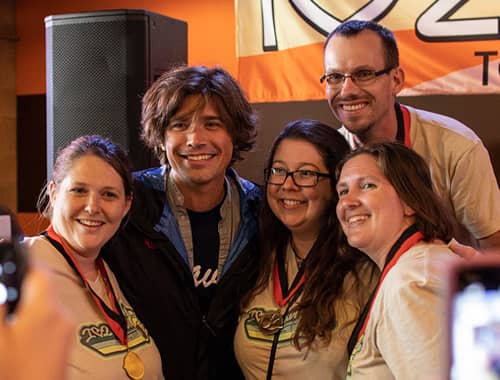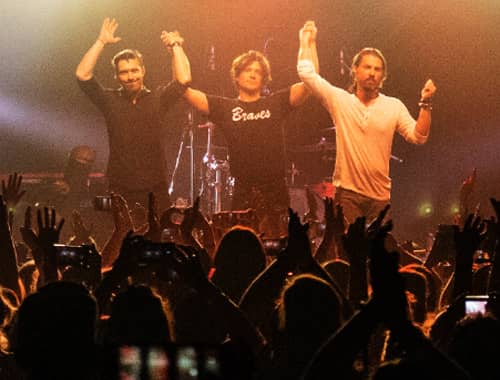Urban Tulsa Weekly
Jul 15, 2004 |
Six years ago the brothers Hanson were riding a huge wave of international popularity . . . touring the world in support of their multi-platinum-selling debut, Middle of Nowhere, staging massive, sold-out concerts across North America, fielding offers from Hollywood movers and shakers, appearing on every television talk show imaginable and generally conquering the known teen music universe.
Flash forward to July, 2004. The teen pop movement is dead—not that Hanson ever actually had any involvement with it to begin with, other than unfortunate career timing. The band is now without a major record deal, having walked away from former label Island/Def Jam after their relationship soured over creative differences. (To put it simply, Island/Def Jam wanted another “MMMBop†from three musicians who have absolutely no interest in rehashing past glories. The breakup wasn’t pretty.)
Undaunted by the whole acrimonious experience, Hanson simply started up their own record label, 3CG Records, and plowed straight ahead, eventually releasing Underneath earlier this year, a 13-track CD co-produced by the guys, which contains some of the most engaging music to date in the group’s already impressive songwriting career.
To say Hanson has experienced upheaval within their ranks in the past few years is an understatement. Since the release of their sophomore effort, This Time Around in 2000, the band has not only gained corporate independence, they’ve also parted ways with their longtime management and legal team, and relocated for extended periods to Los Angeles and New York while wrangling with their former record label.
Besides all that, Taylor married his longtime sweetheart, Natalie Bryant, in 2002 and has since become a father.
In the midst of it all, the band found the time to record more than 60 new songs during this period, 13 of which were eventually culled together to form Underneath.
Since June, Hanson had been laboring away in seclusion at a downtown Tulsa practice space, preparing for their first major US tour in nearly four years. During the final night of rehearsals, I drop in and catch the last 15 minutes of an impressively powerful set. Though the band is obviously enjoying themselves, flailing away at their instruments with abandon (while effortlessly pulling off inhumanly tight three-part harmonies, as ever), there’s a palpable intensity to the session as well. Musical parts are second-guessed, stage movements analyzed, arrangements discussed and re-discussed.
Two things are made abundantly clear: 1. These guys definitely mean business, and 2. This tour is important to them. Very important. Underneath was the top selling independent release in the country when it hit the stores in April. It’s time to get out there and give the fans what they want now...a great rock show. That’s an assignment Hanson takes seriously.
Even though the venues and crowds will be smaller this time out--the national radio coverage a fraction of what it was in 1998 and the fan fervor calmed from a deafening teenage scream-fest to a more laid back, high school/college-age buzz--the guys are still as hyped as ever about hitting the road. Ike (23), Taylor (21) and Zac (18) remain optimistic about their future in the big, bad music biz, unfazed by the well-publicized decline of the industry at large.
In fact, the guys seem more excited now about their career than when they were experiencing their first wave of massive success. The reason is simple: They’re in charge of marketing their music these days and they like it that way.
After rehearsal, as the band begins breaking down their equipment, I manage to corner Ike and Taylor and ask them as few questions about independent life, touring, and the state of the music industry in general.
UTW: You’ve been playing music together since you were pre-teens. Would you say your interpersonal roles within the band have changed at all as you’ve grown up these past seven years?
Taylor: Well, when you’re a kid, you’re just sort of becoming a person. As you get to be a teenager and then an adult you start figuring out who you really are. As each of the three of us is getting older I think we’re each developing a clearer sense of who we are in the band, as brothers, as friends...as kung fu partners.
Ike: The cool thing is I don’t think you ever stop evolving...which is nice.
Taylor: If you do stop then you’re done. But, really, the basic things that have always inspired us are still the same: our values and our musical heritage.
UTW: Do you like touring?
Ike: I love touring. There are very few things I like more than being on the road. In some ways it’s more liberating than recording. It’s a similar experience in that you’re creating music…but it’s very extroverted, the polar opposite from the creative process.
Taylor: We’ve made our music, and it gives us joy to play it, so now it’s time to take it to the next level. I’m just really looking forward to the chance to get up there on stage and show the world who we really are.
UTW: Does it ever get boring?
Ike: No, not at all. We’ve got 40 songs in our repertoire that we can pull from for a 20 song show, so we change it up all the time. We’ve got two shows scheduled here in Tulsa, but the second show will be very different from the first one.
UTW: You guys made a pretty defiant decision to walk away from a major record deal and start your own independent label. How is that working out for you so far?
Taylor: I think what we did is on the leading edge of what’s happening in the music industry today. But we did it out of necessity…not because we’re geniuses or anything. I just think artists should lead the music industry. They need to push the envelope…not because they’re doing a new drug, but because they’re talking about things that are actually relevant. I mean, not every band’s gonna form their own label in the future—it’s too expensive and too cumbersome.
But the only way the music industry can really work is if it’s based on entrepreneurial people who understand how to help artists grow.
UTW: Obviously, that’s not been the basic model for the music industry for a long time--if ever.
Taylor: Well, the problem is, at some point the record companies all started thinking they were untouchable. But no one’s untouchable. They got this concept into their heads that they could just copy past successes instead of developing new talent.
When something big happened, they would all try to copy it. It was like “Wow if only we could create 20 bands just like Hootie and the Blowfish we could sell 10 million records every day! We’re geniuses!â€
But then people stopped reacting to the music. There’s just no machine that can create talent.
UTW: But honestly, is there even going to be a music industry in 10 years?
Taylor: Yes, there is.
Ike: Artists aren’t going anywhere, they’ll always be around.
UTW: But the machinery that runs the industry seems to be eating itself alive right now…
Taylor: It is, yes. There’s just gonna be a different kind of industry in 10 years.
UTW: What will it be?
Taylor: No one knows.
UTW: What would you guess?
Ike: Well, here’s the thing. The reason we formed our own label was so we wouldn’t have to guess--so we can grow and change with the times.
UTW: Do you guys like running your own label? It’s an awful lot of work isn’t it?
Ike: The label is some of the hardest work we’ve ever done, but it’s also some of the most rewarding work at the same time.
Taylor: We have a small team that works endless hours . . .
Ike: Yeah, one of our favorite expressions is “We’re soooooo indie.â€
Taylor: We did all kinds of promotions on our own for the new release. We filmed the last acoustic show we did, for example, and then had it showing in movie theatres across the country. Before it was



